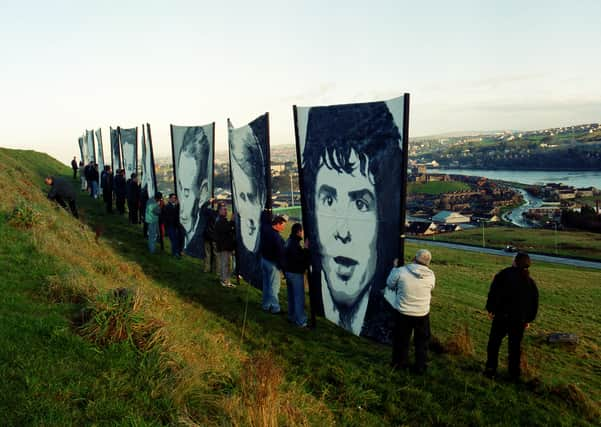Declassified 1997 papers: John Major advised by officials not to apologise for Bloody Sunday


Declassified files show officials were even reluctant to express regret over the events of January 30. 1972, when 13 anti-internment protestors were shot dead in the Bogside.
Mr. Major’s backroom team were concerned this would be seen as a ‘sop to nationalists’ and that it could provoke a backlash in the British press.
Advertisement
Hide AdAdvertisement
Hide AdJohn Holmes, the British Prime Minister’s private secretary, in a confidential memo on February 7, 1997, noted that John Hume and members of the Bloody Sunday families were seeking a meeting.
“You and I both saw many difficulties in this, but I asked the Northern Ireland Office (NIO) for advice - now attached. As you will see Paddy Mayhew [Secretary of State for the north] proposes that he should see Hume and the families but that you should write to Hume expressing ‘profound regret’ for what happened.
“He argues that this would be very different from apologising (which would effectively accept responsibility and open the door for calls for prosecutions), and that it would be helpful both to support Hume against Sinn Féin and show sensitivity to the feelings of the families.”
Mr. Holmes wrote that he had run the NIO proposal past the Ministry of Defence (MoD) which whilst ‘initially uncomfortable, not least since some of those involved are still serving’ could ‘live with it.’
Advertisement
Hide AdAdvertisement
Hide AdHe continued: “I have just read the Widgery Report. While the final conclusions say that the troops were probably fired on first, it is not difficult, at this distance, to read between the lines that the soldiers concerned panicked and shot unarmed demonstrators with little obvious justification. It was certainly an inglorious episode, which we genuinely can regret.
“But the politics of saying so are not straightforward. True it gets easier as we get further away in time from the event. And the calls in the pro-Unionist Belfast press and by Ken Maginnis [Ulster Unionist Party MP] for Her Majesty’s Government to apologise make it easier still. But the distinction between regret and apologise while real enough in some ways, may not be entirely apparent to the great British press. There is an obvious risk of headlines about U-turns, apologies and sops to Nationalists.”
A separate letter from W K Lindsay of the NIO’s Political Affairs Division to John Major’s office outlines Patrick Mayhew’s views.
“Sir Patrick proposes that he offer Hume the meeting himself. He also suggests that the Prime Minister writes to Hume welcoming the approach and uses the chance to make an expression of regret for Bloody Sunday,” he wrote.
Advertisement
Hide AdAdvertisement
Hide AdThe NIO drafted a letter to be sent to Mr. Hume by Mr. Major that stopped short of an apology.
It reads: “As I know you understand I cannot place myself in judgement upon the actions of any of those involved after a quarter of a century except that I regard those killed as innocent of any allegations that they were shot while handling firearms or explosives, as I have long made clear to you. What I can do, however, is something that follows naturally from that, I can express profound regret that the events of that tragic day should ever have occurred: and this I do readily and willingly.”